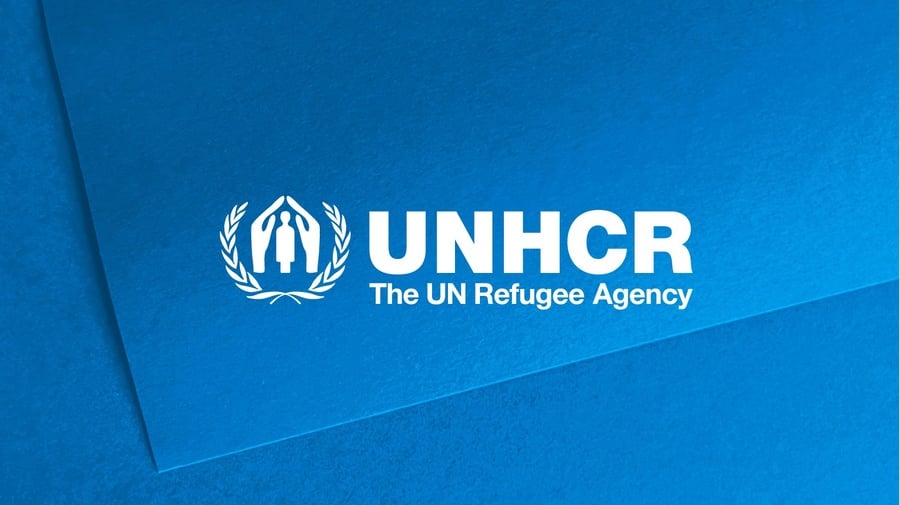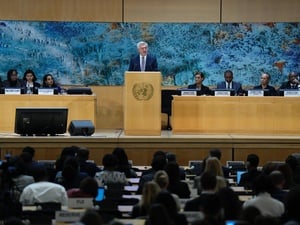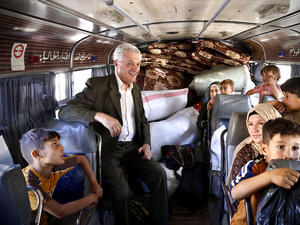High Commissioner’s statement to the Third Committee of the United Nations General Assembly
High Commissioner’s statement to the Third Committee of the United Nations General Assembly

Mr Chairman,
We have all watched in shock the events in Israel and Gaza over the past four weeks including the devastating bombing of Jabalia refugee camp today. I echo the calls of the Secretary-General for an immediate humanitarian ceasefire, unhindered humanitarian access, the release of hostages, and for a neglected peace process to finally start again so that the repeated, and increasingly deadly, cycle of violence can finally end. I also pay tribute to the humanitarians – United Nations staff, NGOs, ICRC, Red Crescent and others – who are on the ground in Gaza, doing what they can in terrifying circumstances. I wish to pay tribute in particular to UNRWA staff – my former organisation - and express my deepest condolences to them and the families of the now 67 colleagues killed.
UNHCR, as you know, does not have a mandate to operate in the Occupied Palestinian Territory, but as a humanitarian organization we are anguished by the loss of Israeli and Palestinian civilian lives, and – currently – by the extraordinary human suffering inflicted on the people of Gaza by the Israeli military operation. Civilians and civilian infrastructure must be protected in line with international humanitarian law and adequate humanitarian assistance must reach civilians. Let’s not forget that about half of all Gazans are children.
I also share the concerns of many about how this war could destabilise other parts of the world, especially in the Middle East, where UNHCR is present with large operations and where millions of refugees are anxiously watching the evolution of this war.
And while the events in Israel and Gaza dominate the news, we must also be able to focus on and respond to more than one crisis at a time. Because conflict, violence, and persecution continue throughout the world, killing, maiming, and displacing civilians, often with an utter disregard for the basic laws of war, and for humanity. More than 114 million people have now been forced from their homes as a result, up from 110 million at our last official count; nearly 90 percent of these people live in low- and middle-income countries making it a problem that can lead to further fragility. It is little wonder that, in a world that somehow ‘tolerates’ 114 million people being displaced, in other words left behind, we are unable to make meaningful progress against achieving the Sustainable Development Goals and leaving no one behind. And, conversely, if we could make progress – real progress – on all the SDGs, we would rapidly and dramatically reduce the number of displaced.
The war in Sudan erupted on 15 April leaving Sudanese people’s lives upended as suddenly as were those of Ukrainians the year before (and of many Ukrainians now who continue to face death and destruction resulting from the Russian invasion). The Sudan conflict has pushed nearly six million people from their homes, including well over one million refugees into neighbouring countries, many of which are dangerously fragile because of other conflicts and crises. Countries like Chad, for example: on the front lines of the climate emergency, landlocked in an unstable neighbourhood and now having its refugee population almost doubled to one million in just a few months. We should not tire repeating the same message to the military leaders of the parties to the Sudan conflict – please end the violence and spare further harm to your own compatriots.
The rise in the number of forcibly displaced is a symptom of growing or unresolved conflict in many places, often in combination with other causes.
Violence continues unabated for example in the east of the Democratic Republic of Congo, where nearly 1.5 million people have been uprooted this year alone.
Fighting and violations of international humanitarian law are widespread in parts of the Central Sahel forcing people from their homes, including to West Africa’s coastal states.
The climate emergency, combined with conflict, has forced nearly 900,000 people from their homes this year in Somalia.
Myanmar has seen over 400,000 people displaced by violence this year, and the total number of internally displaced people in the country has reached nearly two million, in addition of course to those who have sought refuge abroad, including one million Rohingya people in Bangladesh.
100,000 refugees crossed to Armenia in just a few days last month.
And I could go on and on as the list is long.
Too long.
And while we often mention numbers and statistics, I hope that each of us remembers – and keeps in the forefront of our mind in everything that we do – that each of these is a man, woman or child whose life has been destroyed. Who has lost home, family and friends. Said goodbye – perhaps forever – to relatives who are too old or sick to make an arduous journey to safer locations.
Or never had a chance to say goodbye to those killed.
Mr Chairman,
As members of this committee know, UNHCR is tasked with helping states protect, assist and find solutions to the plight of each of these 114 million people. We do so working alongside many critical partners from UN agencies, international and national NGOs, as well as an increasing number of refugee-led organisations.
Unfortunately, however, while the number of crises grow (we at UNHCR have had to declare a record 46 emergencies in 32 countries in the past twelve months), funding is not.
I know that many of you will – legitimately – suggest that we prioritise. And I want to assure you that we are prioritising. Every year; every day; every operation is being prioritised and re-prioritized, especially as it is rare that more than 50% of the approved budget is ever funded. We have introduced new and streamlined systems, tools and processes. We are re-aligning staffing structures between HQ, regional bureaux, and operations. We are reducing the number of posts to maintain focus on delivery. And in the context of wider United Nations reforms, we work closely with other agencies to rationalise expenditure where possible, such as with the integrated, unbranded fleet management service we co-lead with the World Food Programme.
But the reality is that for the first time in my eight years as High Commissioner, I’m not only worried about our own financial situation, but that of the entire humanitarian system. We are, collectively, at a breaking point. The inability of States to prevent and end conflict – something I raised with the members of the Security Council just a few moments ago – will soon make the humanitarian agenda grow beyond our capacity to scale up everywhere and sustain responses. Humanitarian operations are sorely underfunded. UNHCR alone, for example, faces a shortfall of US$600 million that must be filled before the end of the year. And many of our main donors tell us that the outlook for 2024 is even more worrying.
We are doing what we can. UNHCR’s efforts with the private sector have paid off, with some US$1.2 billion received from individuals, companies and foundations last year. But it is not enough. I therefore appeal to all, especially those with resources, including donors in the Gulf region and those whose multilateral contributions have declined or were never very substantial, to please do more to help.
Cutting humanitarian agencies to the bone leave them exposed, as well of course those they serve, at precisely the time when we need to have a strong, well-resourced aid system so that amidst political failures, we can at least save people’s lives and alleviate their suffering.
Meanwhile we have made remarkable strides in strengthening partnerships with development partners in contexts of forced displacement. The most common pattern, for example with the World Bank, is their increasing involvement with refugee responses through direct support to host governments, enabling them to include refugees in national programmes and sustaining host communities – until refugees can return home voluntarily, in safety, and with dignity. This is becoming quite substantial. OECD data highlight that in the two-year period 2020-2021, more than US$11 billion in development assistance from bilateral and multilateral banks has gone to refugee responses, in addition to funding to UN agencies and others through coordinated humanitarian appeals. I urge host countries to become involved in such programmes as they provide much needed and substantial complements to purely humanitarian responses.
We are also pursuing solutions to displacement wherever we can. I am pleased that resettlement increased again last year and am grateful to those countries playing an important role in this regard. I am also pleased to see more work being done on complementary pathways – like labour mobility programmes, scholarships, and other mechanisms that can bring solutions to refugees. I encourage all to do more in these areas.
Reducing statelessness has also been an area of progress, like in Kenya, for example, where President Ruto issued documentation confirming Kenyan nationality to members of the Pemba community who have lived in the country for years, enabling them to now become full members of Kenyan society.
Inclusion remains a key priority with a number of countries, like Uganda, Colombia and Ecuador, for example. Kenya has also made a remarkable shift in its approach to dealing with refugees and has launched the ground-breaking Shirika Plan, which will shift the response from one of encampment to integrated settlements, bringing benefit to refugees and host communities. I appeal in the strongest of terms for international support to this critical plan, especially direct support to the Government of Kenya from bilateral and multilateral development donors.
We continue to also prioritise work in countries of origin. The Solutions Strategy for Afghan Refugees remains an important platform. Nearly 200,000 Afghan displaced people and around 20,000 refugees have returned in the past 18 months, including to priority areas for return and reintegration. While we continue to press, as part of wider UN efforts, for a reversal of the edicts of the de facto authorities restricting the rights and freedoms of women and girls, we are also trying to step up and provide even more support to Afghans in need, especially women and girls who have been at the receiving end of so much work and so many promises over 20 years and who cannot – especially now – be left to fend for themselves. I therefore hope that we will have better resourced and more flexible funding for humanitarian operations inside Afghanistan, as well as in countries hosting the largest number of Afghan refugees, especially Iran and Pakistan, with a special plea for Pakistan, as discussed with the Government, to deal with humanity with the current challenges represented by unregistered Afghan citizens in the country.
Solutions to displacement also require the building of trust that returning home will be safe, as well as resources to ensure the stability of returns. This is the case in places like Syria, for instance, where more must be done on both aspects. Recent discussions with the Government of Syria – as well as its statement at UNHCR’s Executive Committee meeting last month - are important, and I encourage them to continue to address protection considerations and build the necessary trust among refugees. I also encourage more support to early recovery activities by the international community, enabling those who opt to return voluntarily to live dignified lives.
We continue to work, despite the challenges, towards solutions in Myanmar, including for the Rohingya. We owe it to them as well as to those countries hosting them to do more.
Similarly, we are also working closely with others on the Secretary-General’s Action Agenda on Internal Displacement on solutions for internally displaced people.
Elsewhere, significant numbers of refugees cannot find solutions because of a lack of resources. This is the case, for example, for Burundian refugees: more than 24,000 have said that they want to return and reintegrate in Burundi, but the repatriation programme faces a shortfall of more than US$13 million.
Mr Chairman,
You will have heard me elaborate in many other places about the challenges posed by what we call ‘mixed flows’. Allow me to simply repeat here that they are complicated; but solutions can be found if we first acknowledge the challenge and rid ourselves of simple slogans which work well on social media, but make no difference in reality and instead we should focus on what I call a “whole of route” approach. We are working closely with the International Organisation for Migration within our own respective mandates.
Allow me to repeat – UNHCR is here to support States with this challenge. But let me underline that I will also continue to uphold my mandate and do everything to ensure that access to territory to seek asylum is maintained. It is fundamental to international refugee law and reflects the principle of non-refoulement, as enshrined in customary international law. We cannot – I will not – accept externalising or outsourcing asylum obligations.
Mr Chairman,
In just six weeks, you – Member States of the United Nations – along with other stakeholders, will gather in Geneva for the second Global Refugee Forum. I am grateful – as always – to Switzerland for co-hosting and for the co-convenors past and present for their advice and guidance.
We will meet at a difficult time. The world is more divided today than it has been in our living memory. Tensions that have been brewing for many years have come to the fore following the COVID-19 pandemic, and have been inflamed by wars in Ukraine and Gaza.
But it is my responsibility to appeal to you all to do whatever we can to put these painful and in some cases justified grievances aside and instead focus together on protecting, helping and finding solutions for the 114 million people around the world who are very justified in feeling aggrieved.
Therefore, at the Global Refugee Forum let us please come together in a spirit of unity to show them that they are not forgotten, but rather that the world and its nations, united for once – and in support of one another – can work together to do as we have been tasked and save succeeding generations from the scourge of war.
Thank you.





